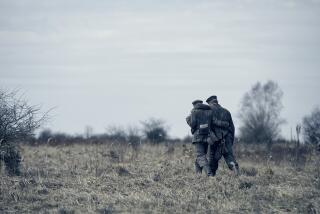MOVIE REVIEW : Kohlhaase Film Portrays Spunky Survivor in East German Society
- Share via
“Solo Sunny” (1979), about a scrappy, aspiring pop singer of limited ability, is a solid, engrossing work in a traditional style directed by the late Konrad Wolf (1925-1982), widely regarded as East Germany’s leading director, and written by Wolfgang Kohlhaase, considered as major a figure as Wolf.
Auburn-haired, pretty and irresistibly impish, Renate Krossner was voted best actress at the 1980 Berlin Film Festival for her portrayal of the determined Sunny, who is subjected to repeated assaults on her dignity as a member of a small, impoverished touring musical revue that plays just about any venue it can grab.
Sunny’s struggle to escape once and for all her drab day job as a factory worker is further complicated by her love life. She falls for a slim, good-looking intellectual (Alexander Lang) with a passion for Indian music but with no desire to commit himself to her; she is pursued by a sweet, devoted cabdriver (Dieter Montag), also a nice-looking fellow but one who, unfortunately, holds no physical attraction for her.
“Solo Sunny” is an affectionate, poignant portrait of a survivor, a young woman insisting on living on her own terms. What’s more, it is a quite honest depiction of the stable but fairly impoverished life in what was the closed society of East Germany. Sunny’s apartment is in a shabby old building, a once-elegant survivor of World War II (and probably World War I as well) that is typical of the crumbling structures lining the streets of East Berlin.
More to Read
Only good movies
Get the Indie Focus newsletter, Mark Olsen's weekly guide to the world of cinema.
You may occasionally receive promotional content from the Los Angeles Times.










